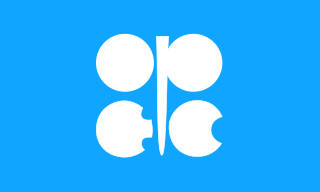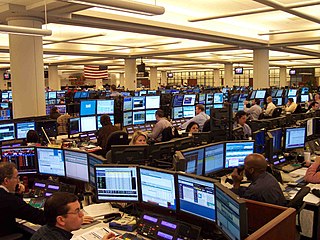
A commodity market is a market that trades in the primary economic sector rather than manufactured products, such as cocoa, fruit and sugar. Hard commodities are mined, such as gold and oil. Futures contracts are the oldest way of investing in commodities. Commodity markets can include physical trading and derivatives trading using spot prices, forwards, futures, and options on futures. Farmers have used a simple form of derivative trading in the commodities market for centuries for price risk management.

The Organization of the Petroleum Exporting Countries is a cartel enabling the co-operation of leading oil-producing and oil-dependent countries in order to collectively influence the global oil market and maximize profit. It was founded on 14 September 1960, in Baghdad by the first five members which are Iran, Iraq, Kuwait, Saudi Arabia, and Venezuela. The organization, which currently comprises 12 member countries, accounted for an estimated 30 percent of global oil production. A 2022 report further details that OPEC member countries were responsible for approximately 38 percent of it. Additionally, it is estimated that 79.5 percent of the world's proven oil reserves are located within OPEC nations, with the Middle East alone accounting for 67.2 percent of OPEC's total reserves.

Energy economics is a broad scientific subject area which includes topics related to supply and use of energy in societies. Considering the cost of energy services and associated value gives economic meaning to the efficiency at which energy can be produced. Energy services can be defined as functions that generate and provide energy to the “desired end services or states”. The efficiency of energy services is dependent on the engineered technology used to produce and supply energy. The goal is to minimise energy input required to produce the energy service, such as lighting (lumens), heating (temperature) and fuel. The main sectors considered in energy economics are transportation and building, although it is relevant to a broad scale of human activities, including households and businesses at a microeconomic level and resource management and environmental impacts at a macroeconomic level.
Market risk is the risk of losses in positions arising from movements in market variables like prices and volatility. There is no unique classification as each classification may refer to different aspects of market risk. Nevertheless, the most commonly used types of market risk are:
The National Energy Program was an energy policy of the Canadian federal government from 1980 to 1985. The economically nationalist policy sought to secure Canadian energy independence, though was strongly opposed by the private sector and the oil-producing Western Canadian provinces, most notably Alberta.

West Texas Intermediate (WTI) is a grade or mix of crude oil; the term is also used to refer to the spot price, the futures price, or assessed price for that oil. In colloquial usage, WTI usually refers to the WTI Crude Oil futures contract traded on the New York Mercantile Exchange (NYMEX). The WTI oil grade is also known as Texas light sweet. Oil produced from any location can be considered WTI if the oil meets the required qualifications. Spot and futures prices of WTI are used as a benchmark in oil pricing. This grade is described as light crude oil because of its low density and sweet because of its low sulfur content.

From the mid-1980s to September 2003, the inflation-adjusted price of a barrel of crude oil on NYMEX was generally under US$25/barrel in 2008 dollars. During 2003, the price rose above $30, reached $60 by 11 August 2005, and peaked at $147.30 in July 2008. Commentators attributed these price increases to many factors, including Middle East tension, soaring demand from China, the falling value of the U.S. dollar, reports showing a decline in petroleum reserves, worries over peak oil, and financial speculation.

Daniel Howard Yergin is an American author and consultant within the energy and economic sectors. Yergin is vice chairman of S&P Global. He was formerly vice chairman of IHS Markit, which merged with S&P in 2022. He founded Cambridge Energy Research Associates, which IHS Markit acquired in 2004. He has authored or co-authored several books on energy and world economics, including the Pulitzer Prize–winning The Prize: The Epic Quest for Oil, Money, and Power, (1991) The Quest: Energy, Security, and the Remaking of the Modern World (2011), and The New Map: Energy, Climate, and the Clash of Nations (2020).

The price of oil, or the oil price, generally refers to the spot price of a barrel of benchmark crude oil—a reference price for buyers and sellers of crude oil such as West Texas Intermediate (WTI), Brent Crude, Dubai Crude, OPEC Reference Basket, Tapis crude, Bonny Light, Urals oil, Isthmus, and Western Canadian Select (WCS). Oil prices are determined by global supply and demand, rather than any country's domestic production level.

A benchmark crude or marker crude is a crude oil that serves as a reference price for buyers and sellers of crude oil. There are three primary benchmarks, West Texas Intermediate (WTI), Brent Blend, and Dubai Crude. Other well-known blends include the OPEC Reference Basket used by OPEC, Tapis Crude which is traded in Singapore, Western Canadian Select used in Canada, Bonny Light used in Nigeria, Urals oil used in Russia and Mexico's Isthmus. Energy Intelligence Group publishes a handbook which identified 195 major crude streams or blends in its 2011 edition.

The nationalization of oil supplies refers to the process of confiscation of oil production operations and their property, generally for the purpose of obtaining more revenue from oil for the governments of oil-producing countries. This process, which should not be confused with restrictions on crude oil exports, represents a significant turning point in the development of oil policy. Nationalization eliminates private business operations—in which private international companies control oil resources within oil-producing countries—and transfers them to the ownership of the governments of those countries. Once these countries become the sole owners of these resources, they have to decide how to maximize the net present value of their known stock of oil in the ground. Several key implications can be observed as a result of oil nationalization. "On the home front, national oil companies are often torn between national expectations that they should 'carry the flag' and their own ambitions for commercial success, which might mean a degree of emancipation from the confines of a national agenda."
Foreign Reports Inc. is a Washington, D.C.–based consulting firm for the oil industry, founded in 1956. Foreign Reports advises energy companies, governments, and financial institutions on world energy issues, with a specialization on the Middle East. The president of the firm is Nathaniel Kern.

Robert David "Bob" Hormats is Vice Chairman of Kissinger Associates. Immediately prior he served as Under Secretary of State for Economic Growth, Energy, and the Environment from 2009 to 2013. Hormats was formerly Vice Chairman of Goldman Sachs (International), which he joined in 1982. He served as Senior Deputy Assistant Secretary, from 1977 to 1979, and Assistant Secretary of State, from 1981 to 1982, at the Bureau of Economic and Business Affairs. He was Ambassador and Deputy U.S. Trade Representative from 1979 to 1981. He served as a senior staff member for International Economic Affairs on the United States National Security Council from 1969 to 1977, where he was senior economic adviser to Henry Kissinger, General Brent Scowcroft and Zbigniew Brzezinski. He helped to manage the Nixon administration's opening of diplomatic relations with China's communist government. He was a recipient of the French Legion of Honor in 1982 and the Arthur S. Flemming Award in 1974.
MEES is a weekly newsletter published by Middle East Petroleum and Economic Publications (Cyprus) Ltd.
Western Canadian Select (WCS) is a heavy sour blend of crude oil that is one of North America's largest heavy crude oil streams and, historically, its cheapest. It was established in December 2004 as a new heavy oil stream by EnCana, Canadian Natural Resources, Petro-Canada and Talisman Energy. It is composed mostly of bitumen blended with sweet synthetic and condensate diluents and 21 existing streams of both conventional and unconventional Alberta heavy crude oils at the large Husky Midstream General Partnership terminal in Hardisty, Alberta. Western Canadian Select—the benchmark for heavy, acidic crudes—is one of many petroleum products from the Western Canadian Sedimentary Basin oil sands. Calgary-based Husky Energy, now a subsidiary of Cenovus, had joined the initial four founders in 2015.

The 2010s oil glut was a significant surplus of crude oil that started in 2014–2015 and accelerated in 2016, with multiple causes. They include general oversupply as unconventional US and Canadian tight oil production reached critical volumes, geopolitical rivalries among oil-producing nations, falling demand across commodities markets due to the deceleration of the Chinese economy, and possible restraint of long-term demand as environmental policy promotes fuel efficiency and steers an increasing share of energy consumption away from fossil fuels.

Indian Strategic Petroleum Reserves Limited (ISPRL) is an Indian company responsible for maintaining the country's strategic petroleum reserves. ISPRL is a wholly owned subsidiary of the Oil Industry Development Board (OIDB), which functions under the administrative control of the Ministry of Petroleum and Natural Gas.
Robert Emile Mabro was an academic who specialised in oil and energy issues. He founded the Oxford Institute for Energy Studies, and in the late 1990s brokered a historic production cut between OPEC and its rivals in the wake of a slump in the price of oil.

Economic turmoil associated with the COVID-19 pandemic has had wide-ranging and severe impacts upon financial markets, including stock, bond, and commodity markets. Major events included a described Russia–Saudi Arabia oil price war, which after failing to reach an OPEC+ agreement resulted in a collapse of crude oil prices and a stock market crash in March 2020. The effects upon markets are part of the COVID-19 recession and are among the many economic impacts of the pandemic.

Richard G. Newell is an American energy economist, environmental economist, and climate policy expert who served as the seventh administrator of the United States Energy Information Administration from 2009 to 2011. He is currently the president and CEO of Resources for the Future, a nonprofit environmental economics research and policy institute in Washington, D.C. He has previously served as Senior Economist for Energy and Environment on the President's Council of Economic Advisers and as Professor of Energy and Environmental Economics at Duke University.













